Itinerary
North of Nadi through sugarcane plantations and past the Sabeto Mountains is Lautoka, nicknamed the Sugar City for the local agriculture and its big processing mill. With a population of around 50,000, it’s the only city besides Suva and, like the capital, has a pleasant waterfront. It’s the sailing point for Blue Lagoon and Beachcomber Cruises but is otherwise unremarkable for tourists, itself having few hotels and fewer good restaurants. Locals recommend the city as a less-expensive place to shop for clothing, but note that it can take as long as 45 minutes to drive here. Legend has it that Lautoka acquired its name when two chiefs engaged in combat and one hit the other with a spear. He proclaimed “lau toka” (spear hit) and thus the future town was named.
Unlike Espiritu Santo with its raised coral reefs and white sand, Ambrym is a volcanically active island with dark sand beaches. Ambrym is known as the island of magic and is the source of five local languages that all evolved on Ambrym. This handful of languages contributes to the well over 100 languages of Vanuatu. Some of Ambrym’s magic takes place in the lush greenery of the local community of Ranon. Here the people perform a very special and traditional ‘Rom’ dance. Participants prepare their masks and costumes in secrecy and the dance is reserved for special occasions.
Port Mary is the name of the bay adjacent to Ghupuna, the main village in Santa Ana. A bright white sand beach with huge shade-giving trees runs along the shoreline in front of the tidy village. The houses here are made with local materials and most are built on stilts. Islanders generally welcome visitors with traditional songs and dances performed by members of the three different villages on Santa Ana. Some local people will also set up stands offering souvenirs for purchase. The Solomons are best known for strings of traditional shell money and elegant carvings based on local stories and legends.
Honiara is the capital city of the Solomon Islands on the north-western coast of Guadalcanal Island. It is the hub of all activity in the archipelago which has recently undergone an ‘urban boom’. Discover the cities beautiful landscapes and the significance of the city in the World War II.
Rabaul, the former provincial capital, has quite a remarkable location. The town is inside the flooded caldera of a giant volcano and several sub-vents are still quite active today! The fumes of the volcano Tavurvur can be seen continually and the town suffered greatly during the last major eruption of 1994 when some 80% of the houses collapsed due to the ash raining down onto their roofs. Rabaul has a Volcano Observatory sitting atop the town’s center, monitoring the 14 active and 23 dormant volcanoes in Papua New Guinea. A small museum opposite the bunker used by Yamamoto during World War II shows exhibits relating to Rabaul’s local, German, Australian and Japanese past from the 19th century to Papua New Guinea’s independence in the 1970s.
Chuuk Lagoon, also previously known as Truk Lagoon is one of the four states of the Federated States of Micronesia. The cluster of 16 much-eroded volcanic islands have mangrove swamps along their coasts with rich rainforests in the central mountainous areas. The islands are hugely popular with scuba divers thanks to the incredibly interesting shipwrecks which have become foundations for new reef growth.
Pulap is an atoll consisting of three islands located in the Pattiw group in the Caroline Islands. The three islands are, Pollap in the north, Tamatam in the south, and Fanadik at the western fringe of the reef. The island is surrounded by a number of ghostly shipwrecks that are virtually intact, submerged underwater. This makes for great diving expeditions where you can explore the reef and its incredible marine life as well as the shipwrecks.
Lamotrek is a coral atoll in the Federated States of Micronesia, and one of the fourteen outlying atolls that partly makeup the island State of Yap. While the total land area is less than half a square mile, it encloses a reef that is 12 square miles in size. The atolls are considered somewhat separate from Yap proper, which is made up of three contiguous islands set higher along the Philippine Sea Plate. The population of Lamotrek is approximately 373, and the residents are accustomed to visitors but still maintain their own culture proudly. Visitors to this small island will be greeted with generosity and friendliness that makes up the essence of the Yapese culture.
Gaferut Atoll is a rookery island full of nesting birds, and one of the fourteen outlying atolls that partly make up the island State of Yap in the Federated States of Micronesia. Just 1,500 feet long and 500 feet wide, Gaferut is called Fayo by the Fareulep people of the neighboring atolls; meaning stone or rock in the Woleaian language. The atolls are considered somewhat separate from Yap proper, which is made up of three contiguous islands set higher along the Philippine Sea Plate. Gaferut and its peer atolls are southeast of a nearly 1-mile reef that teems with beautiful undersea life amidst the clear turquoise waters.
Situated in the western Pacific Ocean lies Guam, the largest and southernmost island in the Mariana Islands archipelago. There is a wealth of history in Guam, it was ceded to the US by Spain in 1898 after the Spanish-American War. Captured by Japan in 1941, it was retaken by the US 3 years later. Come to the end of your expedition in Guam where you can enjoy local culture and visit the historic landmarks.

Services provided
- 24h room service
- Inclusive Internet access Wi-Fi (availability dependent on navigation and latitude)
- Individually-controlled air conditioning
- Dressing room with shelves and closet
- Dressing table and hairdryer
- Hermès top-of-the-line bath products
- Minibar included
- Nespresso coffee maker and boiler
- Electronic safe
- Direct line telephone
- Bose Bluetooth speaker
- Flat screen TV, international channels (availability dependent on navigation) and videos on demand
- 110V American (two flat pins)/220V European (round sockets with two round pins)
- Three ADA staterooms
In addition to the common services provided to all our suites and staterooms:
- Private return transfer
- Priority boarding
- Champagne and fruit basket upon arrival
- Butler service
- An assortment of sweet or savoury canapés and a basket of fruit every day
- A bedroom with one king-size bed (180 x 200 cm) or two single beds (90 x 200 cm) and TV
- A living/dining room with a sofa, an armchair, a TV, a 4-seater table and sliding courtesy door
- A bathroom with shower and balneo bathtub
- A one-hour spa care for one person in the well-being space, chosen from the facial and body treatments on offer
- A private 9 m² balcony
- Two panoramic sliding bay windows

Services provided
- 24h room service
- Inclusive Internet access Wi-Fi (availability dependent on navigation and latitude)
- Individually-controlled air conditioning
- Dressing room with shelves and closet
- Dressing table and hairdryer
- Hermès top-of-the-line bath products
- Minibar included
- Nespresso coffee maker and boiler
- Electronic safe
- Direct line telephone
- Bose Bluetooth speaker
- Flat screen TV, international channels (availability dependent on navigation) and videos on demand
- 110V American (two flat pins)/220V European (round sockets with two round pins)
- Three ADA staterooms
In addition to the common services provided to all our suites and staterooms:
- Champagne and fruit basket upon arrival
- An assortment of sweet or savoury canapés and a basket of fruit every day
- A bedroom with king-size bed (180 x 200 cm) or two single beds (90 x 200 cm) and TV
- A lounge with a sofa convertible to a king-size bed (180 x 200 cm) or two single beds (90 x 200 cm), armchairs, a TV and a sliding courtesy door
- Two bathrooms: one with a shower and one with a bath
- A private 8 m² balcony
- Two panoramic sliding bay windows

Services provided
- 24h room service
- Inclusive Internet access Wi-Fi (availability dependent on navigation and latitude)
- Individually-controlled air conditioning
- Dressing room with shelves and closet
- Dressing table and hairdryer
- Hermès top-of-the-line bath products
- Minibar included
- Nespresso coffee maker and boiler
- Electronic safe
- Direct line telephone
- Bose Bluetooth speaker
- Flat screen TV, international channels (availability dependent on navigation) and videos on demand
- 110V American (two flat pins)/220V European (round sockets with two round pins)
- Three ADA staterooms
In addition to the common services provided to all our suites and staterooms:
- Priority boarding
- Champagne and fruit basket upon arrival
- Butler service
- An assortment of sweet or savoury canapés and a basket of fruit every day
- One king-size bed (180 x 200 cm) or two single beds (90 x 200 cm) and TV
- An armchair and a sofa (167 x 70 cm)
- A bathroom with bath
- A private 5 m² balcony
- A panoramic sliding bay window
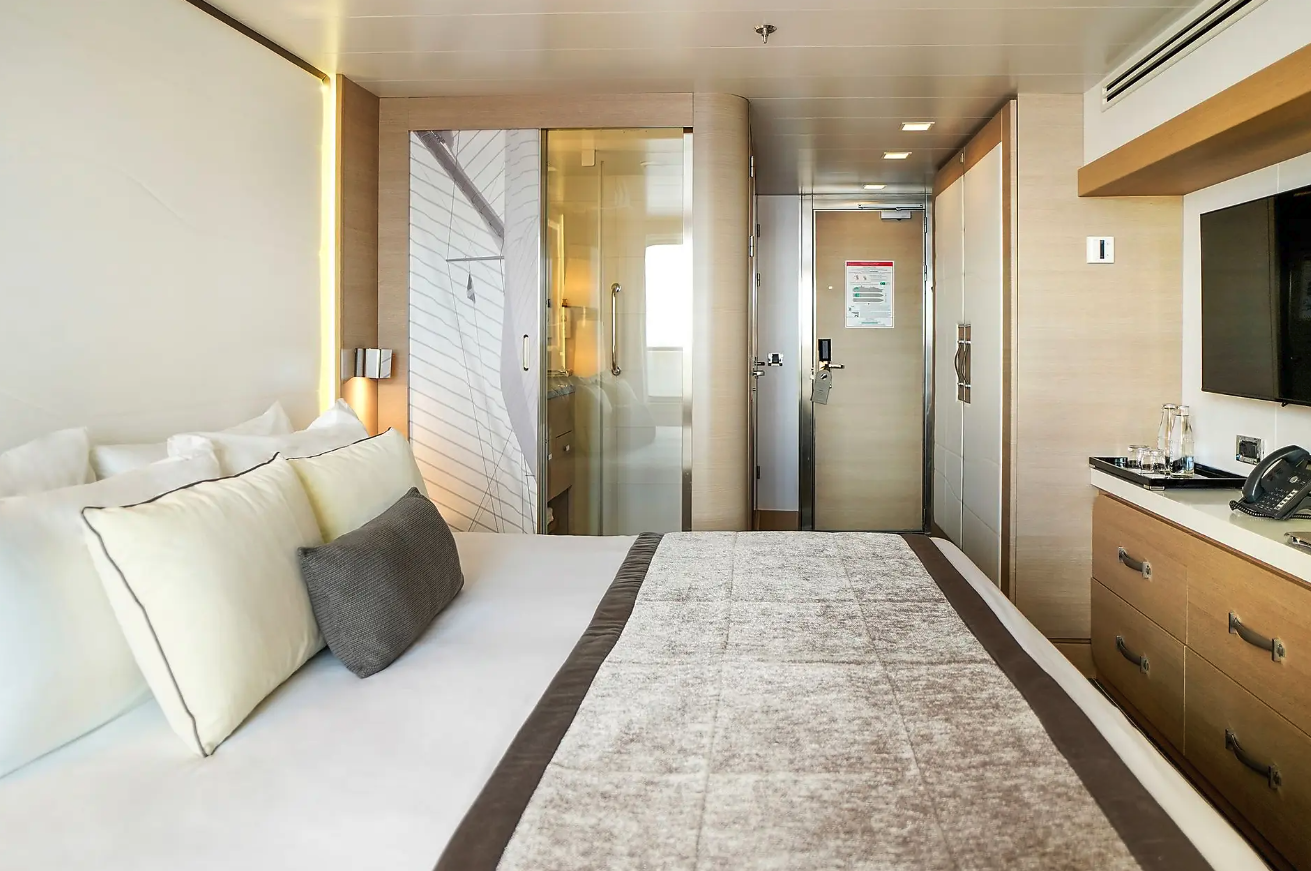
Services provided
- 24h room service
- Inclusive Internet access Wi-Fi (availability dependent on navigation and latitude)
- Individually-controlled air conditioning
- Dressing room with shelves and closet
- Dressing table and hairdryer
- Hermès top-of-the-line bath products
- Minibar included
- Nespresso coffee maker and boiler
- Electronic safe
- Direct line telephone
- Bose Bluetooth speaker
- Flat screen TV, international channels (availability dependent on navigation) and videos on demand
- 110V American (two flat pins)/220V European (round sockets with two round pins)
- Three ADA staterooms
In addition to the common services provided to all our suites and staterooms:
- One king-size bed or two single beds (180 x 200 cm) and TV
- A bathroom with shower
- A window (except for stateroom 300: a round porthole only)
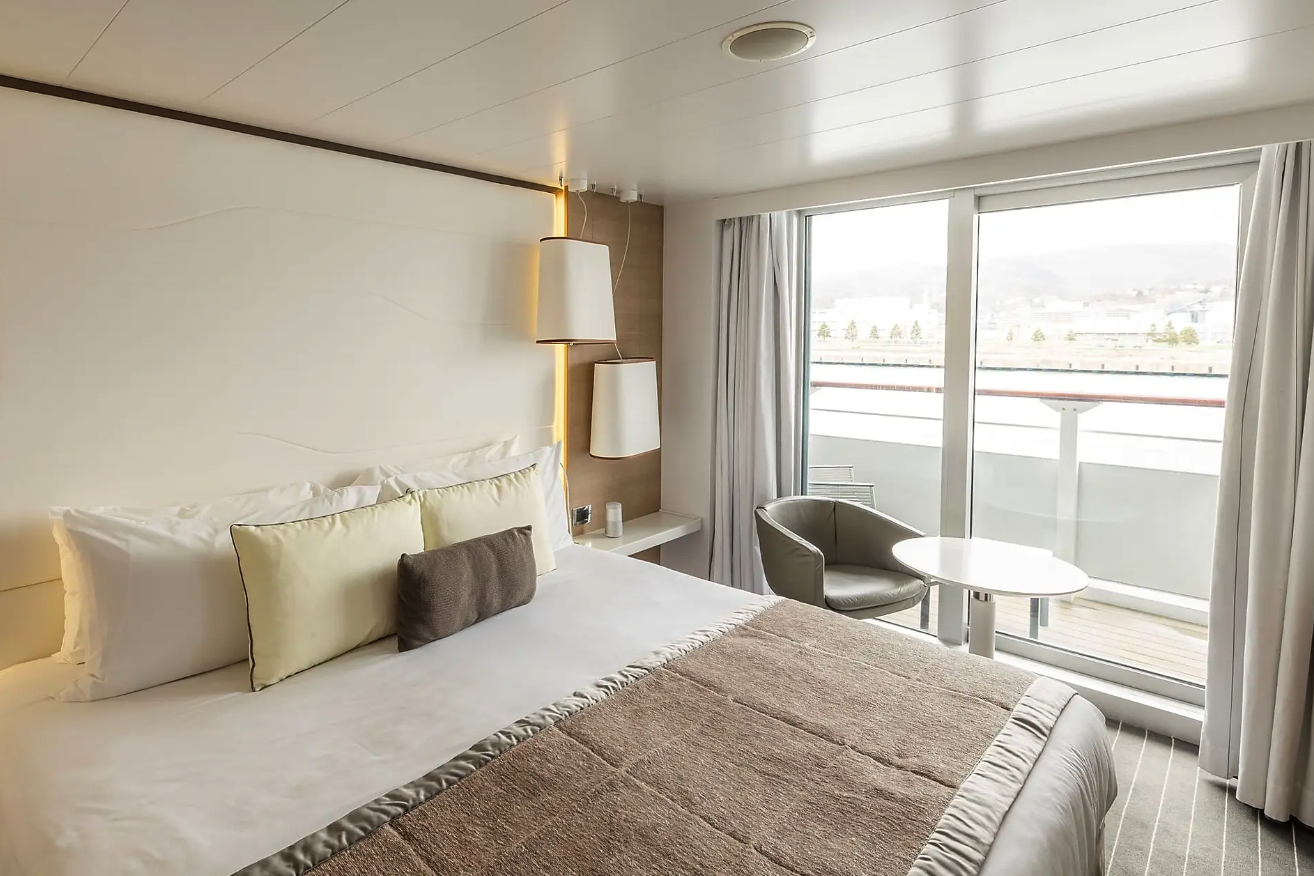
Services provided
- 24h room service
- Inclusive Internet access Wi-Fi (availability dependent on navigation and latitude)
- Individually-controlled air conditioning
- Dressing room with shelves and closet
- Dressing table and hairdryer
- Hermès top-of-the-line bath products
- Minibar included
- Nespresso coffee maker and boiler
- Electronic safe
- Direct line telephone
- Bose Bluetooth speaker
- Flat screen TV, international channels (availability dependent on navigation) and videos on demand
- 110V American (two flat pins)/220V European (round sockets with two round pins)
- Three ADA staterooms
In addition to the common services provided to all our suites and staterooms:
- One king-size bed (180 x 200 cm) or two single beds (90 x 200 cm) and TV
- A bathroom with bath (except staterooms 605 and 625: with shower)
- A private 4 m² balcony
- A panoramic sliding bay window
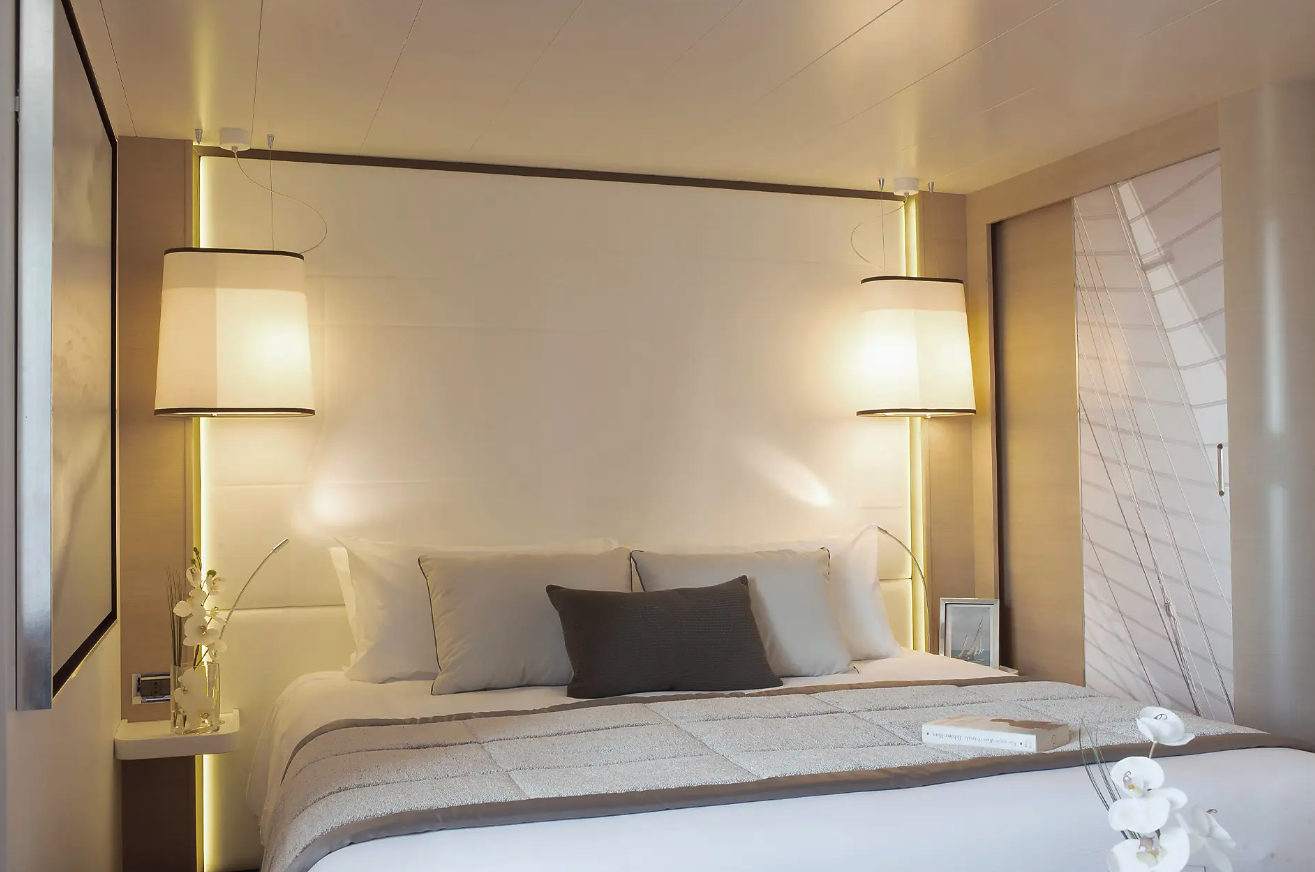
Services provided
- 24h room service
- Inclusive Internet access Wi-Fi (availability dependent on navigation and latitude)
- Individually-controlled air conditioning
- Dressing room with shelves and closet
- Dressing table and hairdryer
- Hermès top-of-the-line bath products
- Minibar included
- Nespresso coffee maker and boiler
- Electronic safe
- Direct line telephone
- Bose Bluetooth speaker
- Flat screen TV, international channels (availability dependent on navigation) and videos on demand
- 110V American (two flat pins)/220V European (round sockets with two round pins)
- Three ADA staterooms
In addition to the common services provided to all our suites and staterooms:
- One king-size bed (180 x 200 cm) or two single beds (90 x 200 cm) and TV
- A bathroom with shower
- A private 4 m² balcony
- A window and a panoramic glazed swing door

To the rear of deck 2 you’ll find a gastronomic restaurant big enough to seat all passengers together at one sitting.
- 3,980 square feet
- Capacity: 268
- Breakfasts, lunches and dinners, French and international cuisine, elegance and refinement
- Wine cellar
- Deck 2

Enjoy breakfasts, buffet lunches and themed dinners in a relaxed atmosphere at the grill restaurant on Deck 6.
- 2,530 square feet
- Interior capacity: 150
- Exterior capacity: 60
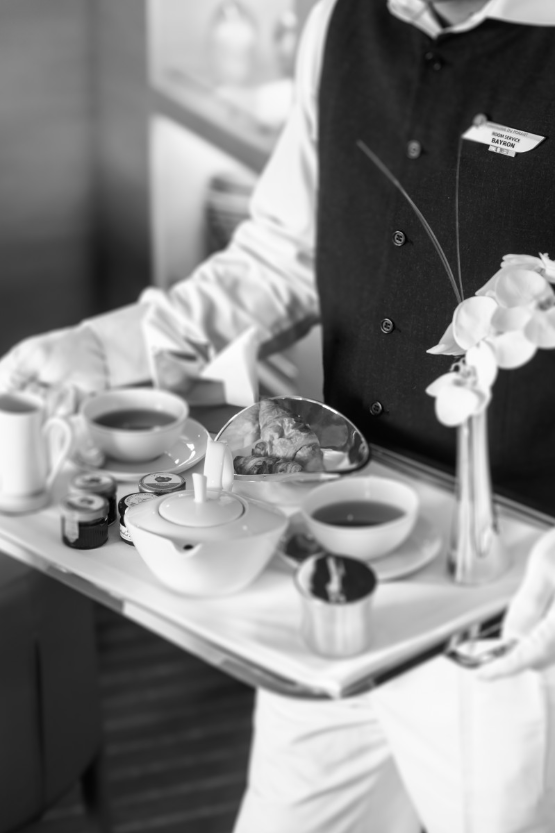
Whether you wish to have breakfast in the privacy of your stateroom, savour a snack in the middle of the day or enjoy your dinner in an intimate setting, our Room Service is available for you. Have a gourmet interlude and treat yourself from a varied menu at any time of day or night*.
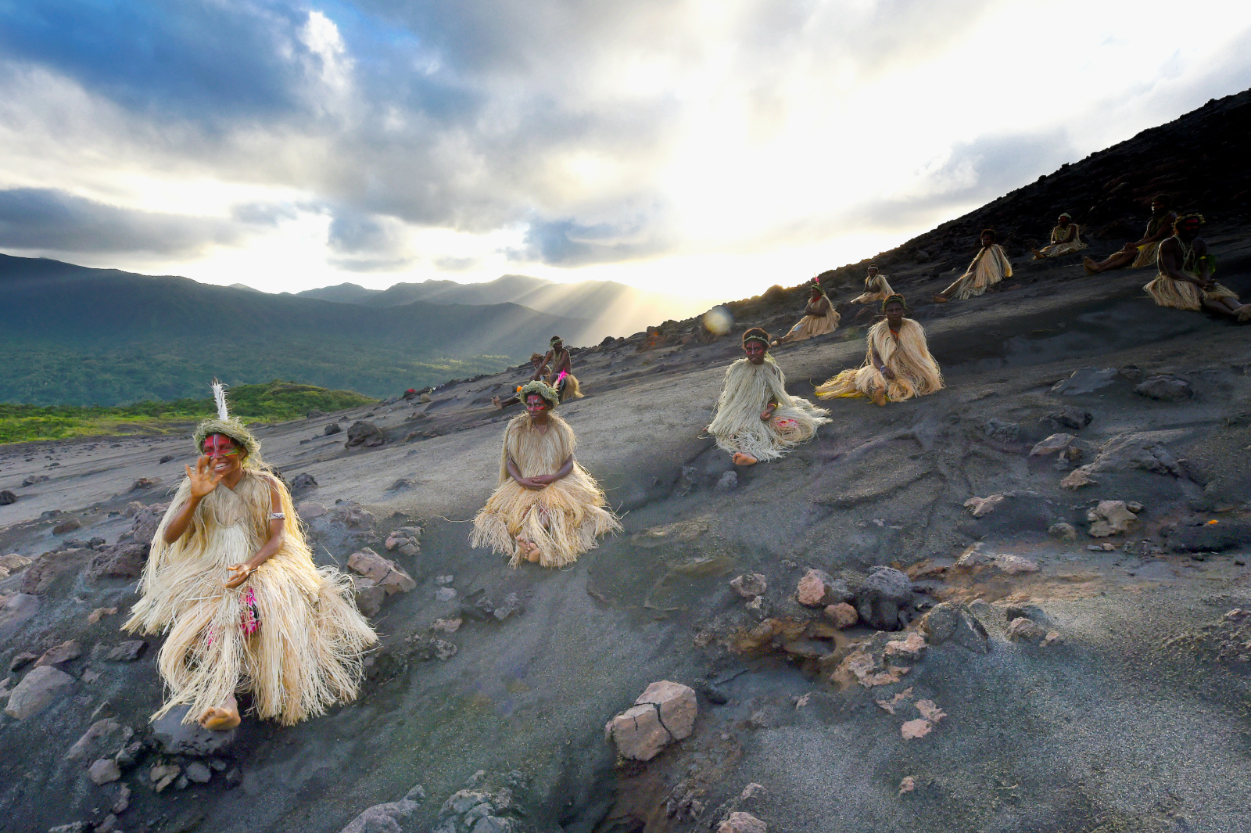
Excursions & land itineraries
Each itinerary has been thoughtfully created by our teams to offer you a complete excursion experience. You can discover the hidden gems of the regions you visit in line with your interests.
Hidden creeks, ancient cities, UNESCO world heritage sites… the world reveals its hidden gems as you journey along the routes taken by travellers. In keeping with our ethos “Accessing the worlds treasures by sea”, we offer a wide choice of land excursions during all our cruises (except for expeditions). Chosen by our PONANT experts for their cultural value and historic interest, these excursions can last a few hours or a few days. If you need to stay on land overnight, we take care of your stay from start to finish, until you rejoin your ship. These longer excursions mean you can discover the unmissable sites of the region you are visiting, like Cuzco in Peru for example or the Mekong Delta in Vietnam.
You can access these trips by pre-booking two months before your departure date.

- Deck 3
- 2,740 square feet
- Interior capacity: 110
- Exterior capacity: 30
- Tea rooms, bar, programme of live musical entertainment, dance floor
- Access to the exterior terrace

- Deck 6
- 1,185 square feet
- Library, internet space, bar, live entertainment on certain evenings
- Direct access to the panoramic terrace

- Deck 4
- 2,690 square feet
- Capacity: 250
- Conference room, concert hall/multi-purpose auditorium
- Audiovisual equipment

On board the sisterships (Le Boreal, L’Austral, Le Soléal and Le Lyrial) and PONANT EXPLORERS, the reception desk and the excursion desk are arranged side by side to facilitate all your requests.
Reception: our receptionists can accommodate you 24 hours a day on all our ships (from 7 a.m. to 11 p.m. on Le Ponant) to answer all your needs, such as room service, etc.
The excursion office: the excursion team is available at all times to tell you about the onshore programmes, organise group or private excursions and to manage transfers at the start or end of the cruise.
On Le Ponant, the receptionist will answer all your questions about excursions.
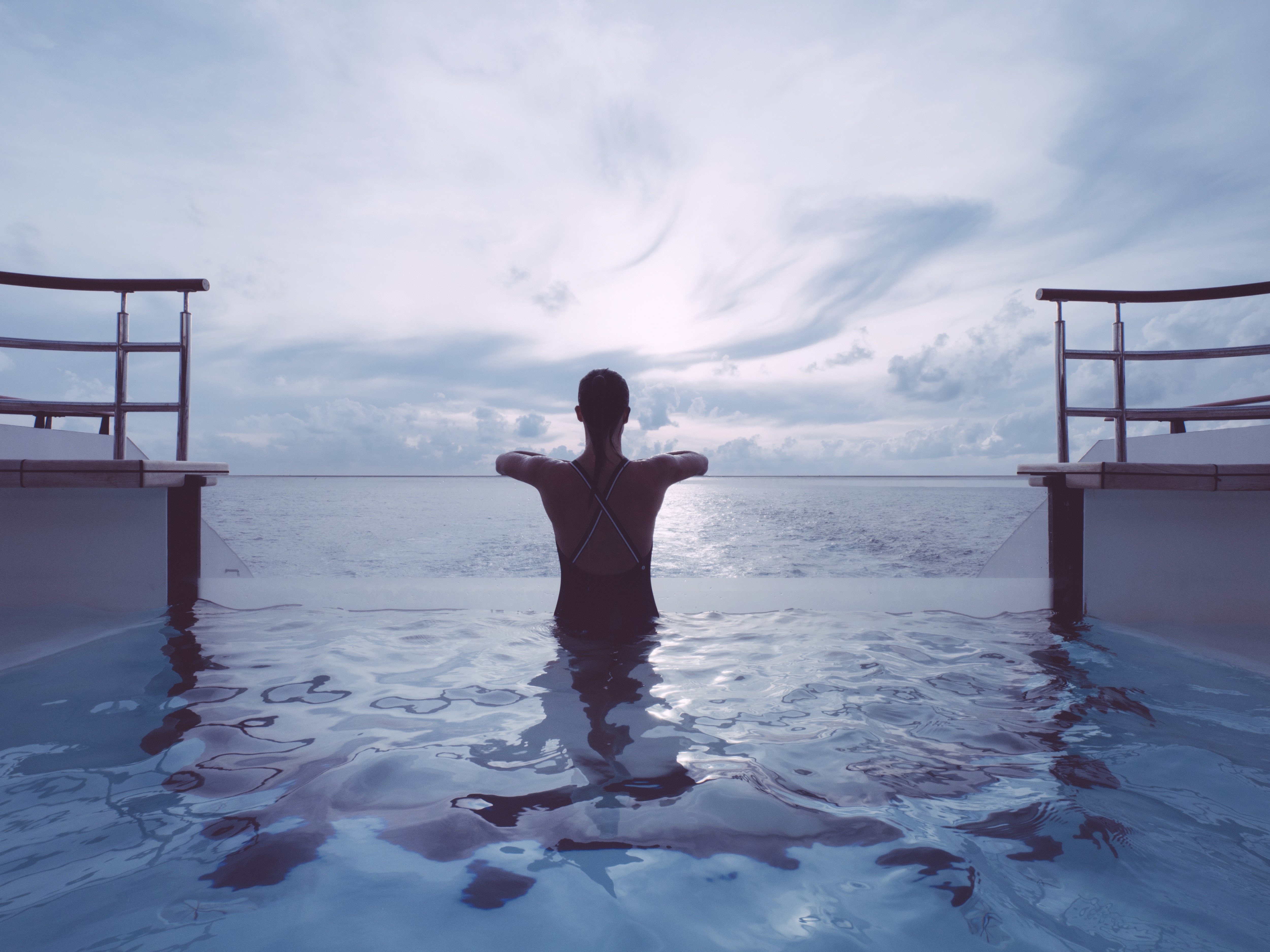
The outdoor areas on our ships, comfortable and conducive to relaxation, have been designed to merge into the sublime scenery and surroundings of the sea and horizon. There is a heated seawater pool featuring its own sun lounge on the top deck of our sister ships (Le Boréal, L’Austral, Le Soléal and Le Lyrial) and on the third deck of the PONANT EXPLORERS (Le Lapérouse, Le Champlain, Le Bougainville, Le Dumont-D’Urville, Le Jacques Cartier and Le Bellot). Le Ponant is equipped with a 400 m² (4,300 ft²) sun deck.
- A swimming pool offering panoramic views and equipped with a counter-current system
- A pleasant, attractive sun deck
- An exterior bar and lounge equipped with armchairs and sofas

- Deck 5
- Studio Ponant: Special area for viewing and ordering photos/videos
- Kids Club (games area + Wii and PS4)
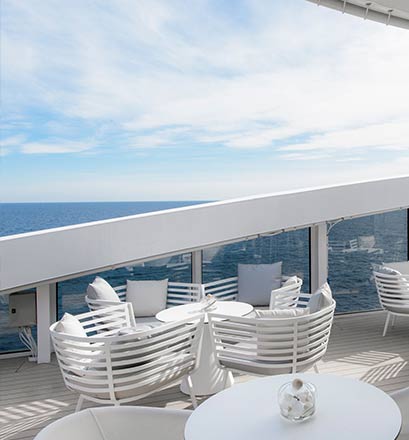
- Deck 6
- Lounge area with seating for 50
- Overlooking the pool deck

On board all our ships, a shop is open during sailing. It offers a selection of presents and souvenirs: clothing, jewellery, beauty products, postcards and accessories.
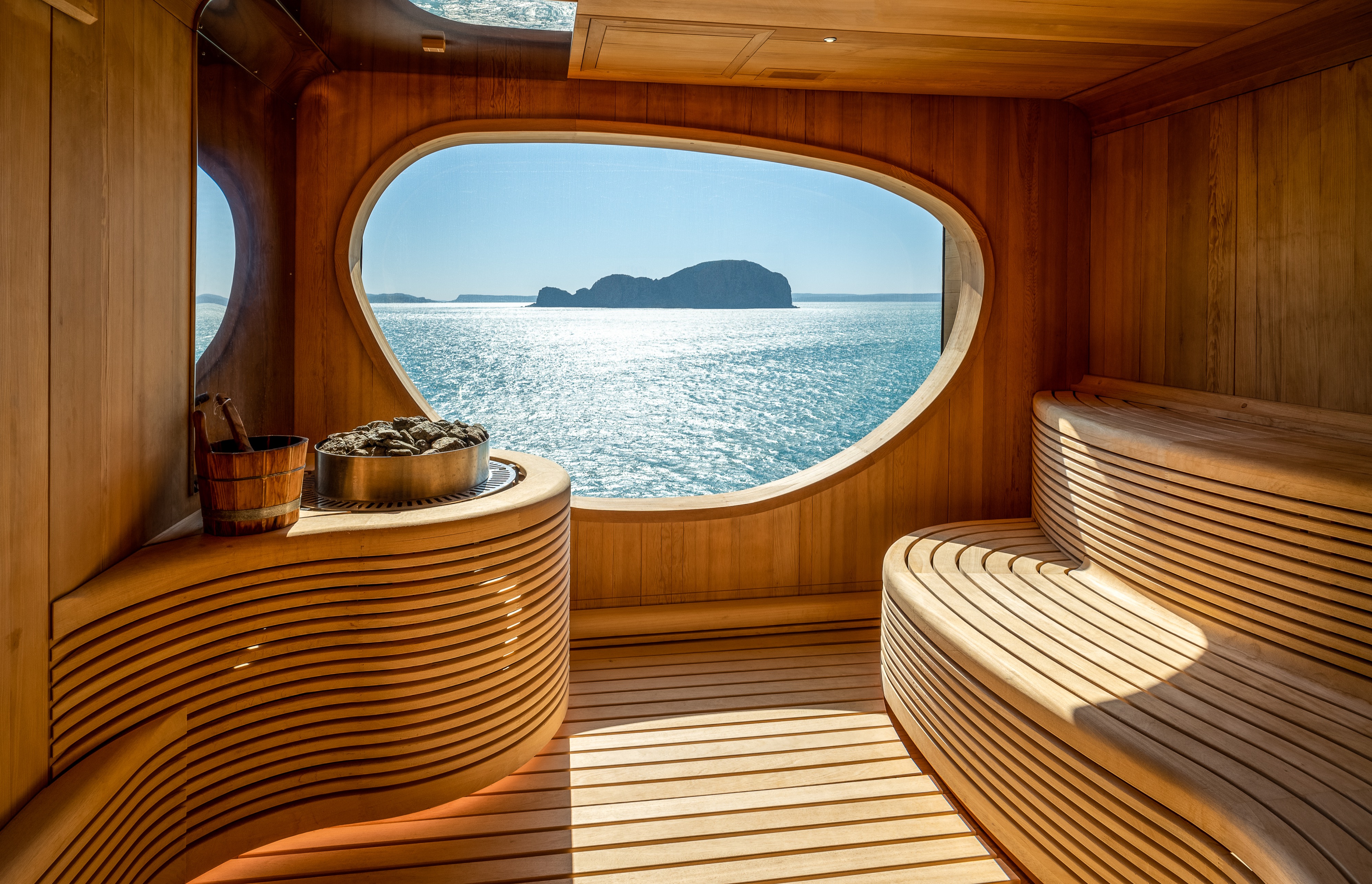
All our ships feature an onboard spa. Equipped with massage cabins and a Turkish bath (Sister ships) or a sauna (Explorers), the spa offers a wide choice of top-of-the-range treatments provided in association with SOTHYS™ or CLARINS (Le Bellot and Le Jacques-Cartier only), leading French spa and wellness centre brands.
Discover a range of facial treatments, aromatic baths, exfoliation and body massage treatments designed to provide moments of complete relaxation. You can also supplement your beauty ritual with additional services such as hair-removal, makeovers, manicures and pedicures.
Prices and details of services in the PONANT Yacht Spa menu.

The gyms on our ships are equipped with the very latest Technogym© equipment and machines. Treadmills, exercise bikes, Kinesis Wall© strength training machines and many other types of equipment are all provided in a laid-back relaxing environment. The wide floor-to-ceiling windows looking out over the sea add undeniable charm to the exercise sessions.
Each day also begins with organised morning workout sessions, either out in the open air or in the theatre. These are supplemented by water aerobics in the pool, or in the sea off the beach for PONANT passengers, when the situation allows it.

Provided in partnership with KÉRASTASE® and L’ORÉAL PROFESSIONNEL®, the hairdressing salon offers a complete range of top quality treatments designed to strengthen, nourish and reinvigorate hair’s shine and brilliance. Our stylists are available to serve all your styling, highlighting, colouring, cutting and tailored hair advice needs.
Your stateroom Officer will be able to take care of your laundry**. The washing and ironing of your clothes will take between 24 and 48 hours. Only ironing** can be delivered on the same day. As dry-cleaning is not possible on the ship, please only give us clothes that can be washed in water.
** These services are not free of charge and are billed directly to your stateroom account.
Closed spaces such as the lounges, the dining room, the staterooms and the reception are non-smoking areas. We invite you to smoke in designated outdoor parts of the ship.
Adapters are provided on board, they are available at the reception office of our ships.
European Standard Sockets
The 220 volt 50 hertz alternating current is distributed by sockets meeting European standards. Onboard power is 200 volt AC (European standard) and 110 volt AC (North American standard). For safety reasons, hair irons and clothes irons cannot be used in staterooms. Please note that on Le Ponant, 110 volt AC is only available in stateroom bathrooms.
Children under one year of age shall not be authorised to embark on the ships.
For children aged between 1 and 8 years old, an authorisation to board the ship must be made in writing to PONANT. Subject to agreement, a liability waiver must be completed and returned to the company to validate the registration.
On classic cruises (“yachting”), children are accepted from the age of one, with a maximum of 5 children between 1 and 6 years old on board.
On “expedition” cruises children are accepted from 6 years old (except cruises aboard Le Commandant Charcot) and must be fully independent during all the outside activities organised and during disembarkation in rubber boats, be sufficiently tall to sit on the inflatable sides of the boats, and old enough to understand, and immediately respond to the orders given by the persons in charge. As a result, children’s participation in any activity in an inflatable boat shall be subject to the agreement of the Captain and of the Expedition Head, depending on the sea conditions, and the difficulty of disembarking at each location visited. The ships do not carry Parka’s in children’s sizes. Parents must arrange to bring a suitable Parka for children. In all cases, children and young people under the age of 18 are at all times on board or on land under the full and total responsibility of their parents or carers.
Children aged 4 years or more can be welcomed in the Kid’s Club when the service is offered on board
The crew are bilingual in French and English. All signage and announcements made are in French and English. On certain cruises, crew members also speak other languages.
A satellite telephone system is at your disposal for contacting anyone, anywhere in the world. The cost of the call is added to the stateroom account (€6/minute). Calls that you receive can be transferred directly to your stateroom or to any other communal area on the ship. To receive or send faxes, please see Reception.
Free Wi-Fi internet access is available on all of our ships, in both the staterooms and the communal areas. One or several computers are at your disposal in the recreation centres. Please note that the Wi-Fi connection may be discontinued depending on the navigation area and landscapes that may block the vessel from satellite coverage, especially at high latitudes (no connection possible beyond 80° North or South), or for technical reasons beyond our control.
There is a doctor on board available to the passengers on all our ships:
- The schedules of consultation are listed each day in the log book (emergency consultation 24/7).
- The Sisterships, PONANT Explorers and Le Commandant Charcot also have a hospital for any small surgery.
- During the excursions, the passengers are accompanied by a doctor or a nurse.
- There is a fee for consultations on board . The price may vary according to the time and place of the consultation (hospital or staterooms). You must also pay for medications.
- The doctor on board is not authorised to distribute sick leaves and prescriptions. Only accounts and invoices are provided which may be used by the passenger to obtain a refund from his/her health insurance if his/her contract allows.
Medical Consultations
There is a charge for medical consultations undertaken by the doctor or nurse on board. The price can vary according to the time and place of the consultation (hospital or stateroom). Any medication must also be paid for by the passenger. If using medications on a regular basis make sure to bring adequate supplies for the duration of your cruise.
Special Medical Treatment
If you have any special treatment, we ask you to inform the reservation service when you register for the cruise, to note it on the information sheet before departure, then inform the on-board crew at the moment of departure and always keep your medication with you for the duration of the cruise.
Seasickness
Our ships (except Le Ponant) have stabilisers equipped with dynamic fins which adapt to the movements of the ship. This system allows the ship to anticipate and compensate for the pitching and tossing of the sea to achieve greater stability. Passengers suffering from seasickness will see their symptoms alleviated and are pleasantly surprised to not feel uncomfortable during their journey. However it is wise to bring travel motion medication with you for peace of mind.
Our Sisterships, PONANT EXPLORERS and Le Commandant Charcot were designed for people with reduced mobility in mind:
- Specially designed staterooms;
- Access ramps allowing easy movement in communal areas;
- Posters, signage and stateroom numbers are translated into Braille.
Despite these arrangements, each passenger should be able to be independent or travel with a close family member or friend who can give them whatever assistance they require during their trip.
If a person has not been judged suitably fit for travel in complete safety, the company reserves the right to refuse their embarkation. Disembarkation in difficult places or in a Zodiac® is subject to the approval of the Captain, who will always have the safety and wellbeing of the passenger in mind.
Technical Accessories
We advise you to equip yourself with a ski mask, sunglasses, walking poles (available to purchase in the shop), a waterproof rucksack, binoculars, a technical watch, a mosquito head net (for the Arctic) and a waterproof pouch.
We advise our passengers to wear casual and elegant outfits at their convenience, and more formal attire for the Captain’s Dinner.
Sustainable development is enshrined in the company’s articles of association and has been at the heart of the PONANT project since its inception. Founded over thirty years ago by committed sailors, the company was born out of a desire to share a passion for the oceans and the treasures of the Earth. This responsibility commits us to a respectful dialogue with the environment and the populations we meet and to investing in many fields related to the preservation and development of the natural and cultural heritage of the polar and oceanic regions.
Clean Ships
We were among the first cruise operators in the world to abandon the use of heavy fuels, and our ships are equipped with electric diesel engines and SCR catalytic converters, which enable a reduction in fuel consumption and emissions. Our polar exploration ship, Le Commandant Charcot, is a hybrid-electric vessel, propelled by liquefied natural gas (LNG). LNG enables a 25% reduction in carbon emissions, an 85% reduction in nitrogen oxide emissions and a 95% reduction in fine particle emissions. Each time we design a new ship, we equip it with the latest available eco-technologies, enabling us to maintain our position as the cruise industry’s environmental leader, ahead of international regulations in some areas. A commitment recognised by many independent organisations:
- Our entire fleet is Clean Ship certified by the Bureau Veritas. This certification guarantees that our ships fulfil very precise criteria: emissions levels, waste processing, waste water etc.
- In 2020, PONANT was recognised as “the cruise operator with the greenest fleet in the world in terms of airborne emissions” by the German NGO, NABU.
- PONANT was awarded the Prix des Palmes du Tourisme Durable 2020 (Prize for Sustainable Tourism) in the “Voyage” category for the elimination of heavy fuel oil in favour of LS MGO.
- In 2019, PONANT became the first European cruise company to obtain the North American Green Alliance certificate. This certifies that its members have adopted practices and technologies that are respectful towards the environment.
- PONANT is also a signatory of the Charte Bleue from Armateurs de France, which commits the maritime sector to act to protect the marine environment.
Wastewater
All of the wastewater is treated by means of processes that exclude the use of chemical products. The recycled water is used to clean the exterior of the ship. The water that is discharged into the sea is treated, drinkable water.
Waste
We have optimised our organisation in order to reduce waste at the source. Waste is nonetheless still produced on board. As of 2020, 60% of this is sorted and recycled, with an objective of 85% set for 2023. We ensure the complete traceability of this waste.
Single-use plastics
We have eliminated the use of single-use plastics (straws, cups, food serving trays, laundry bags etc.). A metallic flask is issued to each passenger on expedition cruises and water fountains are available in the common areas of the ships. We are also developing the bottling of our water in glass bottles.

- Open-air Bar
- Zodiacs
- Sun Deck

- Pool
- Grill Restaurant
- Owner’s Suites
- Deluxe Suites
- Staterooms
- Library
- Panoramic Lounge
- Panoramic Terrace

- Fitness Room
- Leisure Area
- Spa
- Hair Salon
- Bridge
- Hammam
- Staterooms

- Theatre
- Staterooms

- Main Lounge
- Excursion Desk
- Shop
- Reception Desk
- Staterooms
- Medical Centre

- Gastronomic Restaurant
- Marina

